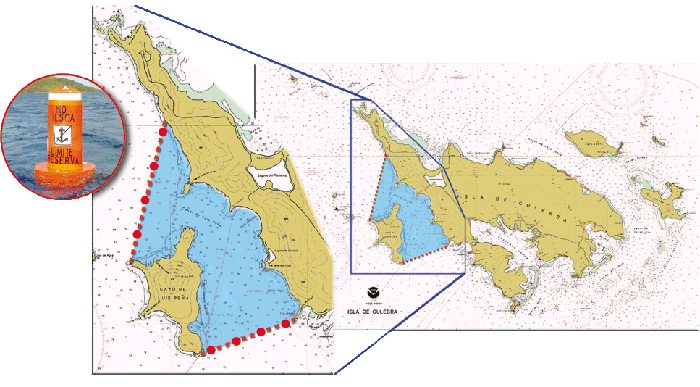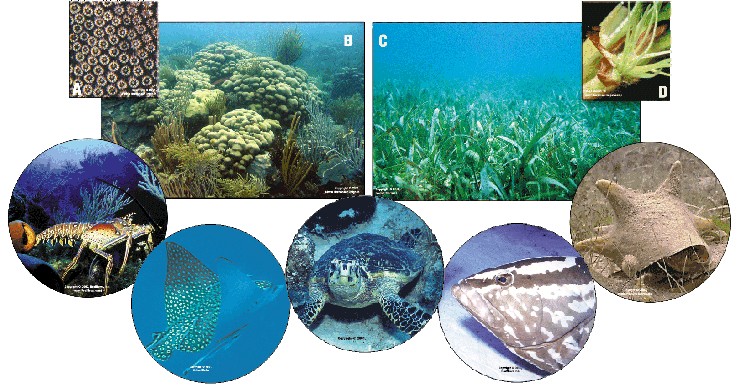Inside the reserve are coral reefs (B) and sea grass
(C). Corals are tiny colonial animals (A). After centuries of growth,
corals create large underwater stony structures called reefs. Coral
reefs protect our shores from pounding storm waves, create Culebra's
spectacular white sand beaches, and provide vital habitat for marine
plants and animals. Sea grass (C) is an important habitat of the coral
reef ecosystem providing food, shelter and breeding grounds for reef
animals. Sea grass is the only plant that flowers underwater (D). Sea
turtles feed on sea grass blades and manatees forage on the roots. The
roots of sea grass secure the sand on the sea floor, keeping coastal
waters clear for the many plants and animals that depend on sunlight
for energy.
ALL OF CULEBRA'S SEA GRASSES ARE LISTED AS CRITICAL HABITAT FOR
ENDANGERED SPECIES, AND ARE PROTECTED BY LAW.
<>< <<
The slightest touch of hands, feet or fins can damage Culebra corals.
<>< <<
The use of mooring buoys protects Culebra's magnificent underwater
world from anchor damage.
<>< <<
Many Caribbean islands have now outlawed jet skis or wave runners
because of their poor safety track record and the threat they pose
to habitats like sea grass and coral and protected species like West
Indian manatees, brown pelicans, sea turtles, calving whales and one
species clearly in danger of extinction but not yet officially listed…human
snorkelers. Boats and jet skis should slow down around Culebra
shore and avoid shallow areas, to help protect Culebra sea turtles,
corals and coastal recreators.
<>< <<
Plan to control erosion from any land clearing activity. In dry climates
it is dangerous to deforest the land and deforestation may harm the
soil as well as accelerate erosion which severely damages tropical
coastal waters. As trees are removed and soil exposed, microorganisms
important for healthy soil are destroyed when exposed to direct sunlight.
Some microbes associated with soil runoff are proving lethal to corals
and pose a risk to public health. This threat is increasing as these
microbes proliferate in ever warming seas. Today coastal runoff from
irresponsible land clearing is causing irreparable harm to the coastal
waters of Culebra and Federally protected species and habitat.
<>< <<
Global Warming is having a profound impact on our coral reefs. Inside
the Luis Peña Channel Natural Reserve Area, we have witnessed
in just the last few years the loss of huge coral colonies that had
been alive since the time of Columbus. The loss was a result of the
lethal combination of coastal water pollution and a profound coral
bleaching event that occurred in the fall of 2005 in response to the
highest sea surface temperatures ever recording in this region of
the Caribbean. The loss in the Caribbean was followed by impacts to
coral reefs in the southern hemisphere as seasons changed and Australia
and Fiji witnessed dramatic coral bleaching and mortality in their
regions.
In 2006, the spectacle of mass spawning of corals in our region did
not take place. This was the first season in the history of scientists
monitoring this event that spawning did not take place. UPR scientists
at the Mayaguez campus took samples of coral and analyzed them. They
found that the corals began their gamete production, but were too
stressed to complete it. The partially produced gametes were being
reabsorbed by the stressed animals, when normally they would have
been released.
The result of the loss of these corals unfortunately, further accelerates
global warming because healthy coral reefs are responsible for sequestering
or harnesses carbon dioxide from our atmosphere. The Earth's rainforests
and coral reefs are natural systems that help to maintain a breathable
and stable climate on our planetary spaceship. We also are losing
our coastal barriers in a time of stronger and larger tropical storms
and hurricanes. As ice melts off the poles, we can expect increased
seismic shifting of the earth's plates further compromising coastal
communities and resources with destructive tsunamis. Caribbean island
cultures are connected to their coral reefs and with the loss of the
reefs, so may result the loss of this cultural diversity.
This should compel us to do everything in our power to reduce
our energy consumption today and by doing so, scientists say that
we can make a profound difference.
The situation we all face today should serve as a lesson learned
to all of man kind that we should take care to never again allow politics
and political agendas to skew scientific facts. The environmental
problems we face today warrant scientifically supported solutions
and should never again be allowed to fall victim to political punditry
that so shamelessly supports such irresponsible conduct on the part
of our industries.
The future of life on our planet now depends on this.
Never cast your vote for any politician who does not have a proven
track record in defense of the environment or the capacity to acknowledge
and understand the situation we all now face.
CORALations, Inc.
P.O. Box 750
Culebra, PR 00775
787-556-6234 / Fax 530-618-4605
1-877-77-CORAL 1-877-77(2-6725)
info@coralations.org

